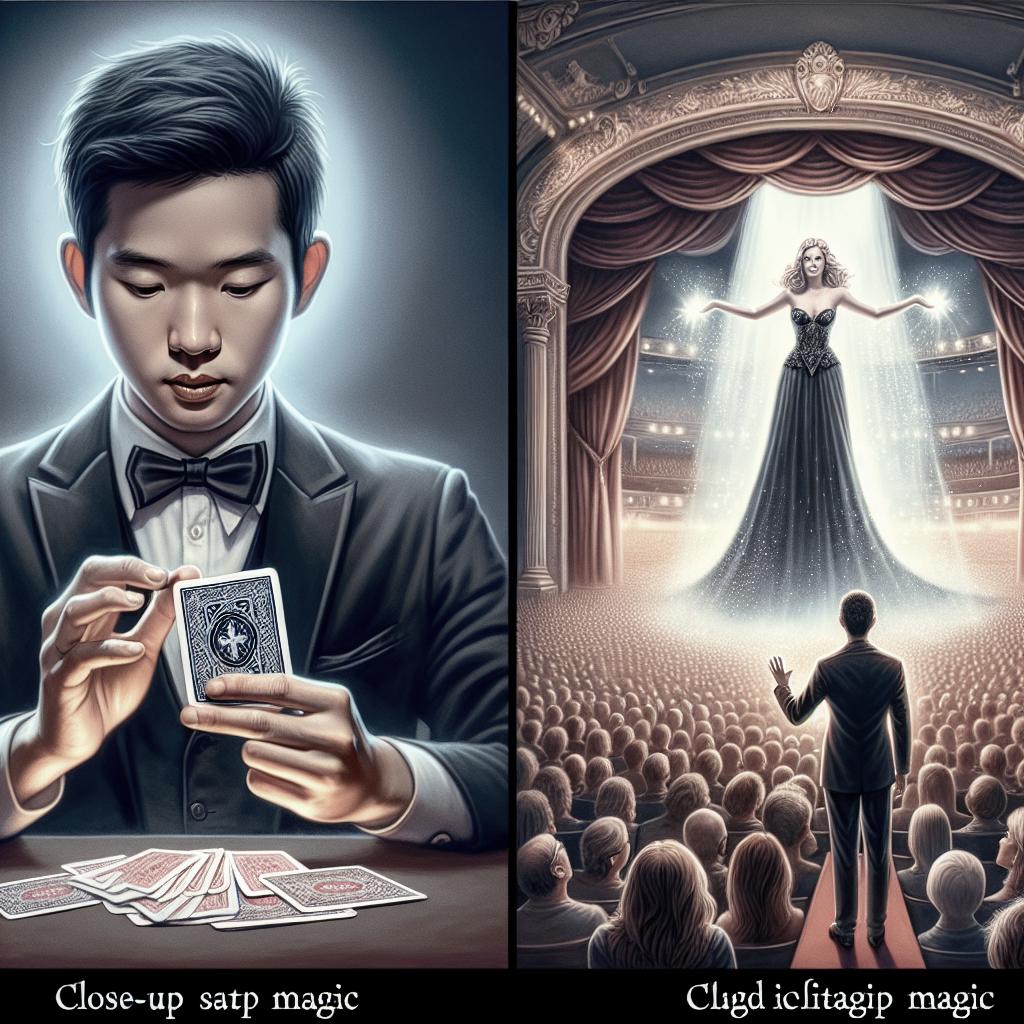“`html
Understanding the World of Magic: Close-Up vs. Stage Magic
Magic, the art of astonishment, can take many forms, but two of the most popular categories within this enchanting art are close-up and stage magic. This blog post aims to illuminate the primary differences between these two magical styles, examining their unique pros and cons. With their distinct approaches, settings, and impacts on their audience, both close-up and stage magic have their own special allure. Whether you’re intrigued by the intimate mystery of close-up magic or the grandeur of stage performances, understanding the nuances between the two can enhance your appreciation of this timeless art. Let’s delve deeper into each category, compare their attributes, and discover what makes each form truly magical in its way.
First, What’s The Difference?
Close-up magic is an art performed in intimate settings, often right under the spectator’s nose. This form of magic boasts sleight of hand and skilled deception with minimal apparatus, using items like cards, coins, and everyday objects. A hallmark of close-up magic is the direct interaction with the audience, fostering awe from the immediacy and seeming impossibility of the tricks.
In contrast, stage magic operates on a larger scale and is designed to entertain a large audience from afar. Stage magicians employ elaborate setups, extravagant props, and often engage in spectacle-driven illusions. The performances are typically choreographed with lighting, music, and dramatic storytelling elements to create a captivating experience that both dazzles and mystifies the audience.
CLOSE-UP MAGIC: Pros and Cons
One of the significant advantages of close-up magic is its personal and interactive nature. Spectators feel more involved in the magic as they become part of the performance, handling props and witnessing magic that occurs inches from their eyes. This interactivity can lead to a more profound emotional impact, leaving audiences bewildered and enchanted.
However, the intimacy of close-up magic also represents its principal drawback. It’s best suited for smaller audiences and private settings, limiting its reach compared to stage magic. Performing in such proximity leaves little room for error, demanding high levels of skill and confidence from the magician to maintain the illusion.
STAGE MAGIC: Pros and Cons
Stage magic stands out for its ability to entertain large audiences simultaneously. With all eyes on the magician, the possibilities for grand illusions and spectacle are almost limitless. The use of elaborate props and special effects enhances the theatricality and allows for more experimental and inventive tricks.
On the downside, stage magic can sometimes feel impersonal, as the audience participates less directly in the magic. While it wows with grandeur, the impact may not be as personally resonant as the up-close connection found in close-up magic. Additionally, stage setups demand significant resources and logistics, making performances more complex to orchestrate.
FINAL THOUGHTS: A Trick of the Trade
Both forms of magic hold their charm and place in the art of illusion. Close-up magic offers an intimate, engaging experience, demanding a high level of skill from the magician to captivate the audience on a personal level. In contrast, stage magic provides a spectacle of grand illusions that can awe a large crowd, showcasing creativity on a broad canvas.
Understanding these differences helps in appreciating both forms of magic and recognizing them for their unique contributions to the world of performance art. Each style requires a distinct set of skills and approaches to magic, offering diverse experiences for audiences to enjoy.
| Aspect | Close-Up Magic | Stage Magic |
|---|---|---|
| Setting | Intimate, small audiences | Large scale, large audiences |
| Interaction | High audience interaction | Low audience interaction |
| Props | Minimal, everyday objects | Elaborate, special effects |
| Emotional Impact | Personal and profound | Grand and awe-inspiring |
| Performance Complexity | Requires skill for close observation | Requires resources and planning |
“`

